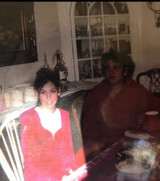In Grief and in Joy...Telling Your Story
People love to hear our stories. It’s part of our innate curiosity. It reveals who we are, and where we came from. It is a record of how we got to where we are right now. Stories are repeated and may be passed down from one generation to another.
When an uncle died, whom I didn’t see in nearly 30 years, I found myself making excuses to dismiss my obligation to go to the funeral. I reasoned that I wouldn’t recognize any of the relatives anymore, nor would they recognize me!
Eventually, I decided that it was important to attend. To my surprise, even though none of my cousins recognized me, just the mention of my name and whose daughter I was brought forth the dawn of recognition and removed all the barriers that time had imposed. We chuckled over the fact that we all had “aged a little bit” and noted the strong family resemblance that could not be denied. The inherited genes were definitely obvious.
Funerals and weddings may be described as a time when extended families get together for a mini reunion. In our busy lives, we have distanced ourselves from family ties and seldom make an effort to connect, other than an occasional Christmas card or email. When a funeral or wedding event draws family home, it can be a time of reuniting with our past and a time to catch a glimpse of our future.
Siblings, cousins, parents, grandparents, aunts and uncles gather to honor the event. But, the reason for coming often has even stronger significance than the ceremonial gathering. It’s a time to tell the stories, in grief and in joy, of days gone by, and the experiences that brought us to this point in our lives. Stories are the interesting portals of life. When told individually, they are just stories, but when woven with the threads of everyone’s memories combined, they speak volumes about the family legacy.
At my uncle’s visitation, cousins quickly grouped together, put names to the faces in frayed picture albums and synchronized the forgotten faces of the generations that gave us our roots. We greedily searched for a glance of fond memories and good times, anything that connected us in times when we were more closely bound than we are today. We reminisced about family, now deceased, and mentally calculated the vintage of the house or car in the picture, or the time and the place where the candid photo was taken. And, after sharing the stories, we hugged each other and laughed once again. Hours later, each returned to his or her life and wondered what the next occasion might be that would bring us together. For those brief few hours in time, we were family reuniting as if it were decades earlier. Telling stories is an important part of healing grief. In our Wings© grief education series, we strongly emphasize story preparation that gives the griever control of whatever details and emotions he or she is willing to reveal. We all know the feeling of being “surprised” when someone asks blunt questions about our loved one’s death or says something that empties our emotional deposit of tears. There are ways to prepare yourself for telling your story thus reaping the benefits of sharing your loved one’s life. Plan your story, in advance, and know what you want to say before you begin. It is human nature to want to share the stories of life (and death) with someone who will listen, but initially you may have a difficult time blurting out even the “short” version of your loved one’s death. Remember you have two stories: the public story and the private story. Prepare both, in advance. Respectfully acknowledge the person asking the question, by answering with your “short-version.” Some things are meant to be private and not shared with others.
Prepare your response to sensitive questions. When someone asks: “What happened? How did he die?” Nothing can set you back more than an insensitive question. What you tell will vary depending upon who is asking the question. Some people may be curious and pry for more information than you are willing to share, so plan to prevent a defensive reaction to an unexpected, sensitive question. People sometimes speak without thinking how their remark may sound to a bereaved person—and we react.
When our son, Chad died because of suicide, I was extremely sensitive to this social taboo. I shuddered when someone asked me what happened, feeling threatened by what seemed like they were intruding on my emotional reservoir. I learned to subtly side-step the question offering other information about my son’s life (how he lived!). That neutralized the discussion, and everyone was more comfortable.
Practice telling your story to trusted friends because you will be asked repeatedly—both at social events and in the months to follow. Take every opportunity to tell your story because repetition makes it easier. Repetition helps heal the pain.
Reveal the passions and strengths of the person who died. Why do you read an obituary? Typically, it is because we want to know how people lived their lives. What was it he liked? How did he spend his time? Those attending the funeral (or asking about him/her much later) probably only knew your loved one for a certain period-of-time in their life. This gives them a glimpse of different stages of your loved one’s life and fills in the gaps where words fall short. Stories should celebrate passions, hobbies, interests, and achievements.
Validate Relationships. Don’t hesitate to validate how important this person was in your life. It is okay to say things like:” Our relationship was very close.” Or “I’ll miss him.” Or “He was my best friend.” If the person you are talking to makes a comment about his/her relationship with your loved one, validate it! Recognize and acknowledge how grateful you are that he shared a memory.
Posting pictures (at the visitation) of family and friends with the person who died tells its own story and creates joyful conversation. You can also validate a person’s relationship with your loved one by commenting how he/she spoke of him in a positive way. Relating a story you know about their relationship with the deceased creates a bond and connection that is meaningful.
Never underestimate how far relationships may reach. When my dad died at age seventy-nine, we thought his circle of friends was quite small since he was retired for almost 20 years. We were astounded when dozens and dozens of people came to the visitation. Some had met him through the pool league (billiards), others through his bartending job after retirement. People in their twenties through their eighties came to acknowledge their relationship with my dad. Makes a heart feel good!
Encourage Imagination. Telling your story can include thoughts like: “I remember the time when...” Everyone feels comfortable over a good chuckle or an adventurous story. Tell humorous versions of human blunders or reveal stories of risks taken, accomplishments made and forgotten dreams. When you tell your story, find ways to excite the listener’s imagination so that he or she can visualize exactly what you are saying. We live vicariously through the stories of others. Some of your best stories will come from people who came to pay their respects and share a memory with you. The evening of Chad’s visitation, my husband picked up a photo that was among our son’s belongings from an Army National Guard training in Utah a few months earlier. Chad appeared in the photo with three officers, but we didn’t know the story that went with the photo. When the officers who came to his funeral saw the photo, they finished the amusing story behind the mischievous grin that Chad wore. This story has been an important part of our memories since that day and reminds us that everybody loves a story, and the stories of life are priceless.
Pause, reflect, and connect. Telling your story should conclude with a connection. We all try to make connections with other people that make us feel good. We want to relate to the challenges, frustrations and ups-and-downs of life. We want to bank these stories in our memory of people met, places visited, things learned, and experiences lived. We connect with joy (wedding, births, celebrations) and we connect with sorrow (loss, defeat, illness, hard times). We may react with a lump in the throat, a tear in the eye or a hearty laugh from deep within. We are spiritual beings having human experiences—trying to make sense out of life and death. We are creating our own story of life. Your story can make a soul connection. It is also the moment that allows you to slow your racing heart, regain your composure and give honor to someone special. “Memories are a way of holding on to the ones we love.”
Our son died years ago, and his story continues to evolve. In my book, I include a tribute that says, “Because I loved him, I remember. Because I remember, he will never die.”
Your story is a gift. When you tell it, you disclose your love and the soul connection you have with the person who died. Nothing is more sacred or more respected than the memory that lingers. Stories, whether you are telling them or hearing them from someone else are the windows to the heart. The hope that emerges redefines you. You are who you are, partly because of your relationship with the person who died. The stories of a life lived can enrich and bless you, and the lives of those still living. Connect with your inner psyche; breathe deeply; relax. This is your moment, your time to tell the story, in grief and in joy. Each becomes a part of your journal of life.
©2006 (revised 2022)
About the Author
Nan and Gary Zastrow are the founders of Wings-a Grief Education Ministry since 1993 after the death of their son, Chad, to suicide and his fiancé 10 weeks later. As certified bereavement consultants, their ministry of hope provides education to the bereaved. Nan is the author of 7 books, a Free quarterly online grief E-Letter and dozens of articles published through various resources. Additionally, Wings offers support groups, currently through virtual ZOOMGRIEF. Nan continues as a columnist for Grief Digest magazine since 2003. Visit the website at: www.wingsgrief.org or the Wings Facebook page.




